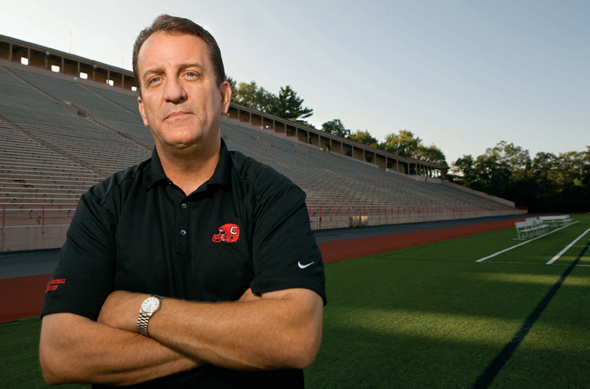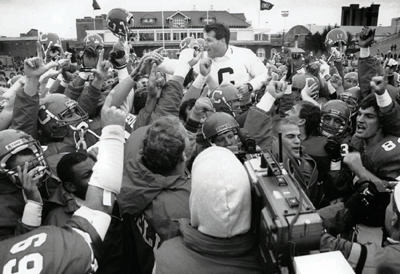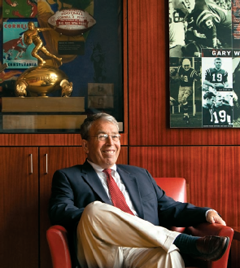 It’s been twenty years since the Big Red last won a share of the Ivy League football title, and it has still never won an outright Ivy championship. As Cornell struggles to recruit qualified players and compete against the financial aid offerings of its richer peers, a new coach from a Southern powerhouse has taken the field. Can Kent Austin revive Big Red football?
It’s been twenty years since the Big Red last won a share of the Ivy League football title, and it has still never won an outright Ivy championship. As Cornell struggles to recruit qualified players and compete against the financial aid offerings of its richer peers, a new coach from a Southern powerhouse has taken the field. Can Kent Austin revive Big Red football?
Can Kent Austin revitalize Cornell football?

By Zach Schonbrun
On a sunny Saturday in 1990, the Cornell football team, seeking its second share of the Ivy League title in three years, led Penn 21-15, with one minute and thirty seconds left in the final game of the season. The Big Red defense spread out as Quaker quarterback Doug Hensch, on fourth-and-six, ran a play-action pass. He rolled to his right, looking for receiver Mohamed Ali along the sideline, and threw.
Those who remember what happened next—the pass falling to the turf incomplete, the ecstatic celebration on the field, the euphoric revelry in the stands—believed that Cornell was finally building something. The head coach—Jim Hofher '79, a former star quarterback—was in his first year, and Cornell had also posted winning seasons in 1987 and 1988.
But twenty years have passed since the Big Red last won a share of the Ivy League football title, and Cornell has still never won an outright Ivy championship—a fact that gnaws at its tight-knit alumni base. Over the past decade, the program has sputtered along erratically: with only three winning Ivy seasons, its .300 winning percentage is the third-lowest in the league. This is especially glaring given the recent success of the University's programs in basketball, hockey, lacrosse, wrestling, track and field, and other sports.
In January, Cornell hired a new head coach, the fourth since Hofher left in 1997, and already the hopeful mantra "Operation Fresh Start" is being tossed around the football offices. It is a new start, surely, but its freshness rests on the ingenuity of Kent Austin and the continued support of athletic director Andy Noel, who recently lobbied successfully for an improved financial aid program. It was a triumph for Cornell athletics—a "do-or-die" move, Noel said—and as a housewarming gift it may have provided some comfort to Austin, who walked into his new office facing a major challenge.
There are two doors into Kent Austin's new office, both of which are usually open, a requirement for a man who is mostly in motion. Austin is fidgety, restless; on one hot afternoon in July, he had paused film on the flat-screen TV above his desk to chase after a recruit and his family as they toured the football offices. He was bubbling with energy, like the coffee machine sitting on his side table.
In only a few months, Austin and his staff had already evaluated nearly 2,000 athletes from around the country—astonishingly quick work, considering that only a short time ago he was so focused on University of Mississippi football players that he had no clue Cornell was looking to hire a new head coach. His name was suggested by Mike Gibson, a former colleague (and former Cornell football coach).
Gibson, currently offensive coordinator for the Hamilton Tiger-Cats of the Canadian Football League, worked with Austin in the CFL, when he was the Grey Cup-winning head coach of Saskatchewan. Austin spent fifteen years in the CFL as a quarterback and then a coach before returning to his alma mater, Ole Miss, as an offensive coordinator in 2008. He was so certain he was going to remain there that he hadn't updated his résumé.

But when Jim Knowles '87 resigned after six seasons in Ithaca, that changed. Noel quickly began compiling options for a replacement, and he received more than 120 applications. He took twenty-one names and called a friend, Marc Trestman, a longtime NFL coordinator who is now head coach of the CFL's Montreal Alouettes. When Noel got to Austin's name, there was silence on the other end of the phone.
"You can't get him," Trestman said. "He's a big-time coach who's out of reach." Noel was undaunted. "I knew it was a long shot, but I had to try," he recalls. "So I called Kent."
Before arriving in Ithaca to interview for the job, Austin had never visited Upstate New York. His lone experience with Ivy League football was one trip to the Yale Bowl in his youth. But it was precisely this unfamiliarity that appealed to Noel, who believed that an outsider's perspective was needed to refresh the program. And Austin was enamored with the prospect of running a program again. "To have the opportunity to be a head coach again was key," he says. "To be hired to build a real program, and not just build a team, was a great challenge. And I like good challenges."
Austin has already made important strides, starting with the recruiting program. The coaches are now using a new database that Austin designed. (He did a similar overhaul at Mississippi.) It has digital files for every prospect, including film, scouting reports, transcripts, and financial information. The files can be swapped across the coaches' network, so several sets of eyes can view one recruit's portfolio simultaneously. (In previous years, the offices were stacked with films and reports, most of which piled up and weren't easily passed along.)
The database allows Austin to cast a wider net—a necessary step, he says, in order to find recruits who can be admitted to Cornell. According to recruiting coordinator David Archer '05, Cornell had 390 prospects on its target list in mid-July last year; at the same time this year, it had 746. "This database allows us to find the kid who chooses Cornell," says Archer.

Austin has hired five assistant coaches, each with significant ties to the South. They've divided the southern states into six recruiting regions, placing strategic emphasis on tapping a football hotbed where Cornell has not made significant inroads. It's a necessary approach, Archer says, and a notion lifted from other successful Big Red programs, especially basketball: look outside the heavily recruited Northeast.
The recruiting program has also benefited from alumni donations, and Austin firmly believes that he can bring in the talent he needs to field a winning team. "If I didn't believe we could win here, I wouldn't have left the job that I had," he says. "I had a pretty good job."
Austin's coaching pedigree is built upon offensive creativity, and while he won't go into specifics, he indicates that his on-field schemes won't be copied from Knowles's playbook. "I didn't even look at it," he says, grinning. Austin also says that he expects a great deal from his players, down to the details of how they wear their jerseys and keep their lockers. He is crafting a code of conduct that he believes his players will adhere to if they value being on the team.
"He's here to build a program," says Buck Briggs '76, the team's radio color analyst. "He's here to establish a system, so we know what Cornell football is."
Austin inherited a young team that lost its top four offensive contributors and two of its starting offensive linemen. He also inherited a tight inner circle of football alumni, whose deep well of optimism hasn't dried out entirely.
Cornell Football 1991-2009
Close calls and major letdowns
The Big Red football team last won a share of the Ivy championship in 1990 under head coach Jim Hofher '79. Here are the head coaches and their records since then:
| 1991 | Jim Hofher | 5-5; 4-3 Ivy, tie-4th |
| 1992 | Jim Hofher | 7-3; 4-3 Ivy, tie-4th |
| 1993 | Jim Hofher | 4-6; 3-4 Ivy, tie-4th |
| 1994 | Jim Hofher | 6-4; 3-4 Ivy, tie-4th |
| 1995 | Jim Hofher | 6-4; 5-2 Ivy, tie-2nd |
| 1996 | Jim Hofher | 4-6; 4-3 Ivy, tie-3rd |
| 1997 | Jim Hofher | 6-4; 4-3 Ivy, tie-3rd |
| 1998 | Pete Mangurian | 4-6; 1-6 Ivy, tie-7th |
| 1999 | Pete Mangurian | 7-3; 5-2 Ivy, tie-3rd |
| 2000 | Pete Mangurian | 5-5; 5-2 Ivy, tie-2nd |
| 2001 | Tim Pendergast | 2-7; 2-5 Ivy, tie-6th |
| 2002 | Tim Pendergast | 4-6; 3-4 Ivy, tie-5th |
| 2003 | Tim Pendergast | 1-9; 0-7 Ivy, 8th |
| 2004 | Jim Knowles | 4-6; 4-3 Ivy, 3rd |
| 2005 | Jim Knowles | 6-4; 4-3 Ivy, tie-4th |
| 2006 | Jim Knowles | 5-5; 3-4 Ivy, tie-4th |
| 2007 | Jim Knowles | 5-5; 2-5 Ivy, 7th |
| 2008 | Jim Knowles | 4-6; 2-5 Ivy, tie-6th |
| 2009 | Jim Knowles | 2-8; 1-6 Ivy, 8th |


